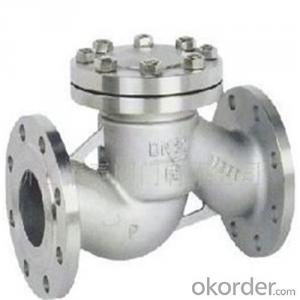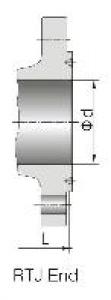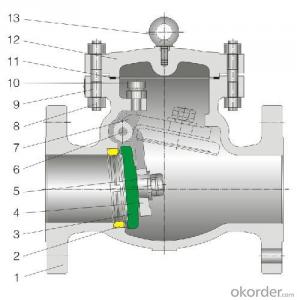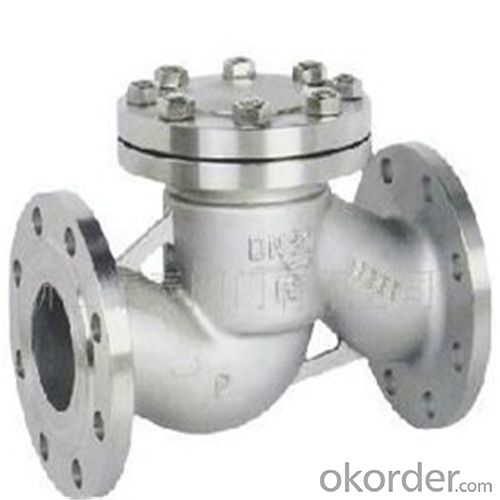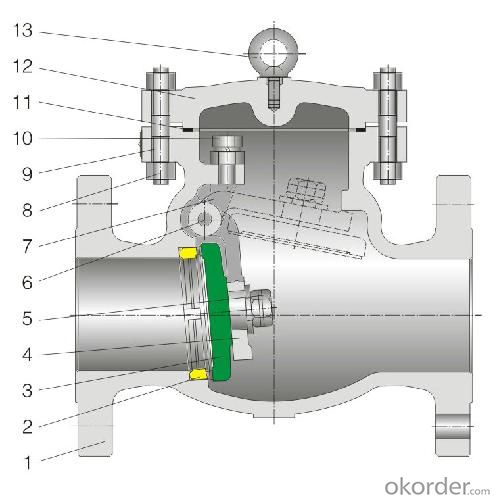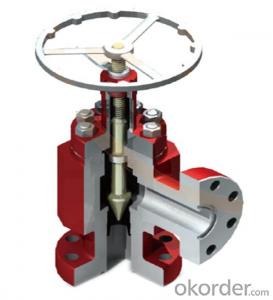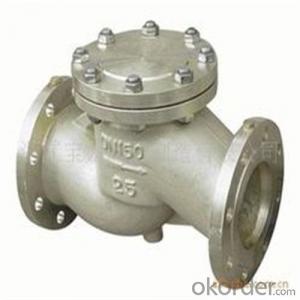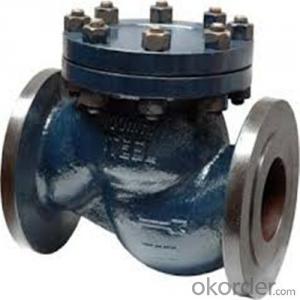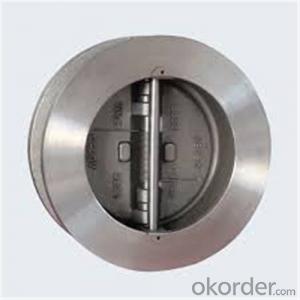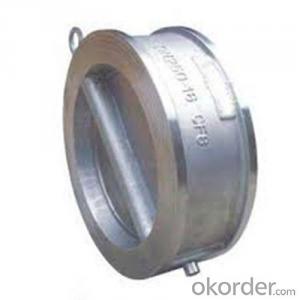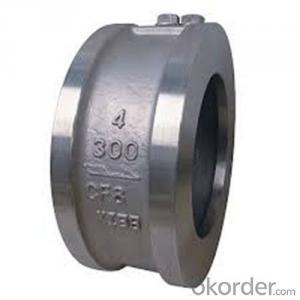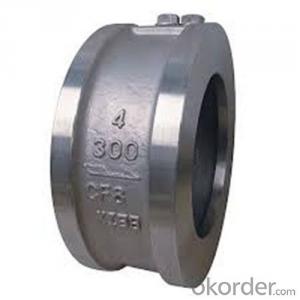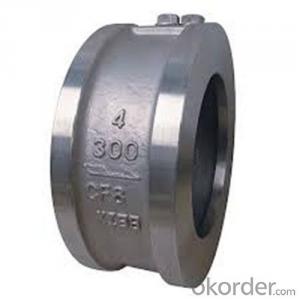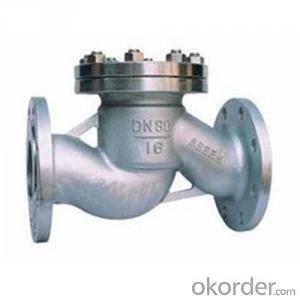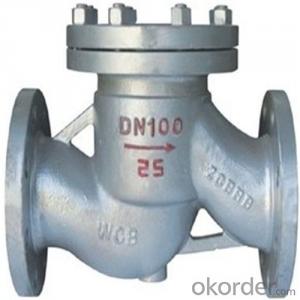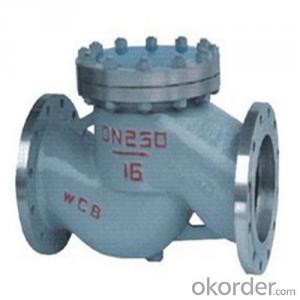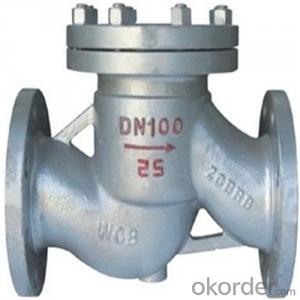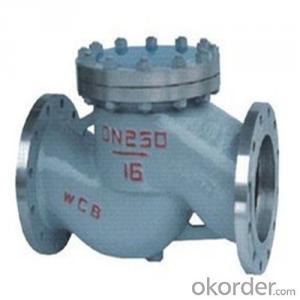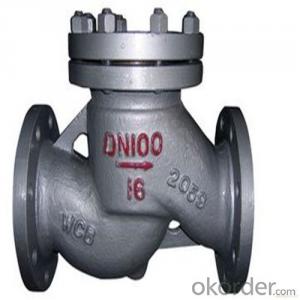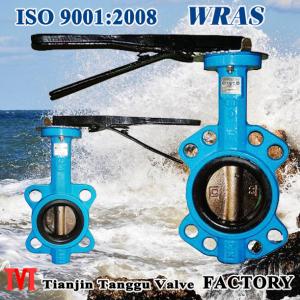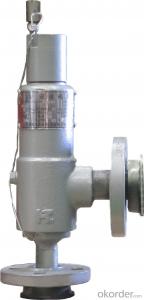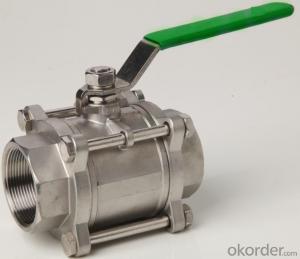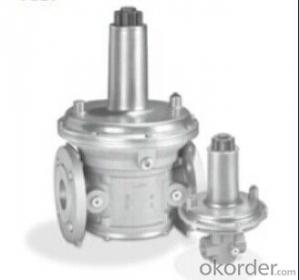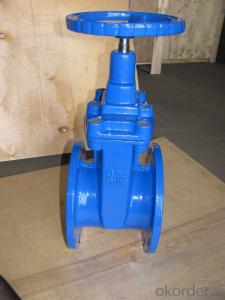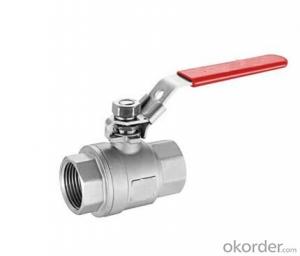API Cast Steel Lift Check Valve Size 400 mm
- Loading Port:
- Shanghai
- Payment Terms:
- TT OR LC
- Min Order Qty:
- 10 pc
- Supply Capability:
- 100 pc/month
OKorder Service Pledge
OKorder Financial Service
You Might Also Like
API Cast Steel Lift Check Valve 150 Class
The features of Cast Steel Lift Check Valve
Bolted Bonnet;Swing and lift disc;Metallic seating surfaces.
Body and Bonnet Connection of Cast Steel Lift Check Valve:
The body and bonnet of Class150~Class900 check valves are usually with studs and nuts.And the body and bonnet of Class1500~Class2500 check valves are usually of pressurized seal design.
Body-To-Bonnet Joint of Cast Steel Lift Check Valve:
Stainless steel + flesible graphite wounded gasket is used for Class 150 and Class 300 check valve;Stainless steel + flexible graphite wounded gasket is used for Class 600 check valve,and joint gasket is also optional for Class 600 check valve;Ring joint gasket is used for Class900 check valve;Pressurized seal design is used for Class 1500~Class 2500 check valves.
Seat of Cast Steel Lift Check Valve:
For carbon steel check valve,the seat is usually forged steel.The sealing surface of the seat is spray welded with hard alloy specified by the customer.Renewable threaded seat is used for NPS<10 check="" valves="" and="" welded="" on="" seat="" can="" be="" also="" optional="" if="" being="" requested="" by="" the="" customer.welded="" is="" used="" for="" nps="">12 crbon steel gate valves .Forstainless steel check valve,integral seat is usually adopted ,or to weld hard alloy directly integrally.Threaded or welded on seat is also optional for stainless steel check valve if being requested by the customer.
Parameter of Cast Steel Check Valve:
Standard Criteria | ASME/ANSI/API customize |
Pressure Rating | 150 Class 300 Class 600 Class 900 Class 1500 Class 2500 Class customize |
Valve Size | 50 mm 65 mm 80 mm 100 mm 125 mm 150 mm 200 mm 250 mm 300 mm 350 mm 400 mm 450 mm 500 mm 600 mm 650 mm 700 mm 750 mm |
2 inch 2.5 inch 3 inch 4 inch 5 inch 6 inch 8 inch 10 inch 12 inch 14 inch 16 inch 18 inch 20 inch 24 inch 26 inch 28 inch 30 inch customize | |
Actuator | Automatic customize |
Connection | Butt Welding Flange RF Flange RTJ customize |
1-Body Material | A216 WCB A351-CF8 A351-CF8M customize |
2-Seat ring | A351-CF8 A351-CF8M A105+13Cr Tool Steel+A105 customize |
3-Disc | Tool Steel+A216 WCB A351-CF8M A351-CF8 A216 WCB+13Cr customize |
4-Arm | A351-CF8 A216 WCB A351-CF8M customize |
5-Nut | A194 8M A194-8 A194 2H customize |
6-Arm pin | A182-F6a A182-F316 A182-F304 customize |
7-Yoke | A351-CF8 A351-CF8M A216 WCB customize |
8-Bonnet nut | A194 8M A194-8 A194 2H customize |
9-Bonnet bolt | A193-B8 A193-B8M A193-B7 customize |
10-Bolt | A193-B7 A193-B8 A193-B8M customize |
11-Gasket | graphite+304 graphite+316 customize |
12-Bonnet | A216 WCB A351-CF8M A351-CF8 customize |
13-Eye bolt | A181 customize |
Design Standard | API 6D BS 1868 customize |
Connection Standard | API 605 ASME B 16.25-2007 ASME B 16.47A ASME B 16.47B ASME B 16.5 MSS SP-44 customize |
Test Standard | API 598 API 6D customize |
Face to Face | ASME B 16.10 customize |
Pressure-temperature ratings | ASME B 16.34-2004 customize |
Wall thickness dimension | API 600 BS 1868 |
FAQ of Cast Steel Check Valve:
Q1:I can’t find the type of steel check valve which I need. what can I do?
The chart above only lists out some common composition of steel check valve parts.We may provide other different parts material composition according to the customer's request or the actual valve working condition.
Q2:Which certification do your products pass?
Our products are in accordance with ISO 9001、ISO 14001、API 6A、API 6D、TS CE、API607/6FA/BS6755.
- Q: We have a 2008 grizzly 700...Lately when we run the 4-wheeler there is a ticking like noise (as is something were loose). I have been told by a few people that it sounds like the valves need adjusting. Does that sound like what it is? Will it cause any damage to the 4-wheeler if we ride it before we get a chance to adjust the valves?
- They are correct. Well almost. The Rockers are what can be adjusted. They are too far away from the valve and are starting to hammer on them instead of just moving them. You will not cause immediate damage by riding it but you could wear out the rocker completely and drop a valve into the engine which would be very costly. Best to get it repaired soon. Make sure they install new rockers and springs. The main cause for this is poor oil maintenance or poor grade of oil being used. Always use a GOOD synthetic oil and your motor will last 10 times as long
- Q: after my hot water tank shuts off about 1/4 cup of water comes out therelief valve. i changed the relief valve. the tank is 6 months old
- Do you mean the heating (burner or heating coils) shuts off. If that is the case then you may need an expansion tank. If there is a reverse flow valve at your meter (most locations now require this feature to prevent back flow of water to the main line.) the pressure in your system can build up higher than normal when the hot water tank is heating. Most systems have a small expansion tank installed near the hot water heater to deal with this problem.
- Q: I am looking at getting a baritone horn of my own, but am not sure what compensating versus non-compensating valves are?
- It okorder /
- Q: Can sum1 tell me how i can tell if my valves are in the right place?I notice there are holes in the valves, please explain how those holes are suppose to face to for each of the 3 valves?
- Put the correct valve in the valve case. (There is usually a notch that guides the placement, but it is not always accurate enough.) Blow gently into the trumpet, (you don't need to play, just blow as you do to clear the spit valves). If you feel a resistance, rotate the valve until the resistance is gone. When there is no resistance with the valve up, depress the valve and blow again. There should be no resistance there either. Repeat with each valve.
- Q: i was told my egr valve needs to be replaced, so im wondering if the system cleaner will help at all. thanx
- well it depends if it needs to be replaced or just cleaned. shops wont tell you to get it clean because they want to chjarge u as much as possible. get sombody u know to clean it by taking it off and using a brush and degreaser. the fuel cleaner wont clean the egr valve it only cleans the combustion chamber.
- Q: wife died at 40 still awaiting results of exsaminers report. Can CPR be given to some one with two artificial heart valves mitral and arotic? She the person administering CPR be aware that they are in the heart...
- Yes, and it doesn't matter if there are artificial valves or not. The thing about CPR is that it's only done for someone who is actively trying to die. The alternative to doing CPR is to let someone pass away, which is not usually the best course of action (unless they have a terminal disease and have asked not to be resuscitated.) If you are asking whether the presence of heart valves excuses someone from NOT doing CPR... then no. If you are asking whether heart valves + CPR and a bad outcome is because CPR should not have been done, then no to that too. The right thing to do for someone who is pulseless is to start CPR, call 911 and get more definitive treatment on the way. CPR is not going to revive someone - it is only a bridge until a defibrillator and/or cardiac drugs are available. I'm sorry that you lost your wife at such a young age, and I hope you find the answers you are looking for.
- Q: My boyfriend just went to his heart doctor and his tricuspid valve is leaking because of his pacemaker wire. They are saying that its moderate to severe. We are trying to decide on what moderate to severe really means. They said the same thing when he was at the doctors in June.
- There are different levels of regurgitation (valve leakage) that can occur: mild, moderate and severe. He needs to speak to the doctors so they can explain what that means in his specific case.
- Q: ex: 4 stroke 16 valve engine
- The intake and exhaust valves in a four stroke engine are timed to allow air intake on the the intake stroke, both closed on the compression and power stroke and the exhaust valve open on the exhaust stroke. The valves on a two stroke engine are generally automatic reed type check valves that allow for an intake stroke and close for the compression and power stroke.
- Q: what exactly causes a valve to stretch?
- Gets warped by the heat and friction over time
- Q: what is the purpose of valves such as: gate valve, foot valve and globe valve in the industry?
- Valves are used to stop/start or control the flow of liquids or gases in pipes. There are many many kinds of valves, so if you want info on a specific type, just list that.
Send your message to us
API Cast Steel Lift Check Valve Size 400 mm
- Loading Port:
- Shanghai
- Payment Terms:
- TT OR LC
- Min Order Qty:
- 10 pc
- Supply Capability:
- 100 pc/month
OKorder Service Pledge
OKorder Financial Service
Similar products
Hot products
Hot Searches
Related keywords
